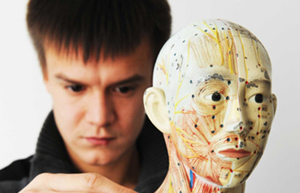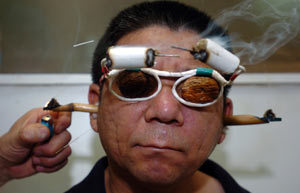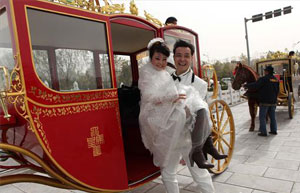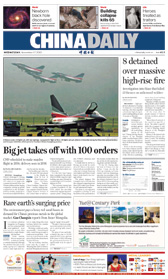EU faces tough decision on Ireland aid plan
Updated: 2010-11-18 14:29
(Xinhua)
BRUSSELS - Due to Ireland's reluctance, the European Union (EU) didn't activate a bailout plan for the country, but decided to send a joint mission to Dublin to find out the real state of its troubled banking sector.
In such circumstances, EU leaders are apparently faced with a tough decision on how to offer tailored aid to Dublin, though there is the 750-billion-euro ($1-trillion) safety net set up in May for eurozone countries, which may face a similar crisis like that in Greece.
IRELAND'S RELUCTANCE
Despite growing market anxiety on the Irish debt crisis, Dublin has been reluctant to seek help from the EU and the International Monetary Fund (IMF).
Irish Prime Minister Brian Cowen said Tuesday that his country had made no application for external support, and reiterated that Ireland was fully funded to the middle of next year. But he confirmed that his government is in talks with the EU over the troubled Irish banking sector, as Finance Minister Brian Lenihan said the joint mission from the EU and the IMF is to address problems in the sector.
"What we have agreed to do is to look at the structural problems in the Irish banks in the light of recent market pressures and assess what needs to be done because banking questions are technical and difficult," the minister said on Wednesday.
| ||||
Dublin seemed to prefer rescuing its banking sector to activating the European Financial Stability Facility (EFSF), since tapping on the safety net will mean tough budget-cutting measures at home, which may include tax raising and wages cutting.
There have been suggestions that Ireland should raise its low corporation tax of 12.5 percent to increase revenues.
Some EU countries have reportedly held grievances against Ireland, accusing it of unfair competition. The relatively low corporate tax has attracted substantial foreign investment in the country and boosted its economic growth.
Ireland, however, dismissed the idea of raising the tax.
NOT ANOTHER GREECE
In response to Ireland's reluctance to seek a bailout plan for the whole country, EU officials insisted that help would be based on a "country program."
Some member states also indicated Ireland must meet the conditions under EFSF, should it solicit help from it.
European Commissioner for Economic and Monetary Affairs Olli Rehn said after the meeting of EU finance ministers on Wednesday that any possible aid plan for Ireland would be a "country program," instead of direct lending to the banking sector.
"They can only do so through a country program, but one with a special emphasis on strengthening the banking sector," he said.
He said the technical talks between the EU and the Irish government will focus on two aspects: one is the four-year budget-cutting plan and its 2011 budget; the other is the state of the Irish banking sector and the need for restructuring.
Although the situation in Ireland incurred comparison with the recent crisis in Greece, but the difference is evident: Ireland won't need extra funds before the middle of next year and its high deficit mainly derived from rescuing its banking sector. It may thus be reasonable to anticipate that the EU will deal with the Irish crisis in a different way.
Paper's Digest

China bags Asiad team tennis title after 24 yrs
Wimbledon semifinalist Li Na led host China to capture the team tennis title on Tuesday at the Asian Games, accomplishing her Asiad tour with three consecutive victories.
China rate rises no panacea to curb inflation: PBOC adviser
Specials

Russian possessed with TCM
Born into a family of doctors, Maxime became interested in Traditional Chinese Medicine (TCM) at the age of 12, after hearing about TCM theories such as health preservation and recuperation.

Acupuncture takes stab at UNESCO list
Acupuncture and Peking Opera have been selected as candidates for UNESCO intangible cultural heritage status.

The wedding coach comes back to life
A groom carries his bride from a wedding coach in Xuchang, Henan province, Nov 11, 2010. Produced a local factory, various original hand-made wedding carriages were displayed on the streets, attracting young people chasing fashion and an environment-friendly lifestyle.



